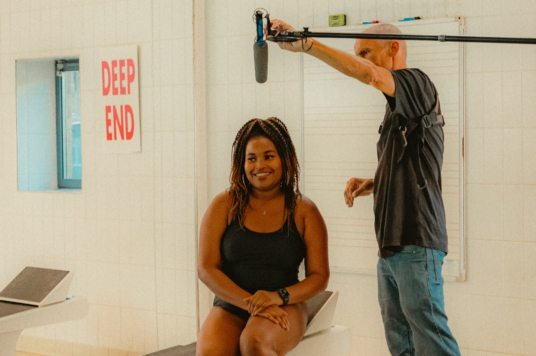St George’s patient features in Netflix documentary about adults learning to swim
Maria Gbeleyi was just seven months old when she was diagnosed with the genetic health condition sickle cell anaemia.
Now in her thirties, and a south London resident, Maria receives treatment at St George’s Hospital for her condition which predominately affects people from the Black community – and features in a new Netflix movie called Black Stroke.
The movie documents Maria’s journey of achieving a lifetime goal of learning to swim – something she feared may not have been possible because of her condition – and also features a scene where the Croydon resident receives a blood transfusion at St George’s.
Maria receives a blood transfusion every six weeks to make her condition more manageable.
“One thing that has made a massive difference in my health is the excellent care I receive at St George’s,” Maria said.
“I can’t express enough how this can be the difference between life and death for a person with sickle cell.”
People with the condition have sickle-shaped red blood cells, which can block blood vessels – resulting in a painful episode leading to Maria’s diagnosis at such a young age.
Maria said: “The most common theme I face in terms of challenges is not having the physical capacity to do all I want to do, when your body literally limits your achievements it can be very hard to process.
“I had started 2023 with the goal of learning how to swim or at least float and I also take every opportunity I can to increase sickle cell awareness, especially after the passing of a friend of mine in 2022.”
According to the latest figures from Sport England, 87% of Black adults in the England do not swim.
In Black Stroke Maria is one of three Black people who learn to swim as adults after she was invited to take part by her friend who directed the 12-minute documentary.
Maria said: “I felt assured that every effort would be made to ensure the process was safe for my health and it was.”
The documentary ends with Maria and the other two participants becoming proficient swimmers – and also helps raise awareness of sickle cell.
“I won’t deny that my condition doesn’t affect every aspect of my life,” Maria said.
“It’s interrupted my education, disrupted my career and limited my mobility. However it’s also given me a very resilient and adaptable attitude that I value greatly. I suffer daily with pain but it has made me an empathetic human.”
Sending a message to people who do not have the condition, Maria said: “Every six weeks I depend on eight people having had donated blood to maintain a liveable quality of life. I’m one of so many. I do my part in raising awareness but please do what I cannot for me and my community and that is donating blood”.


